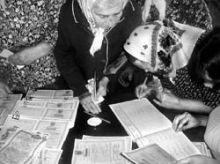The current land market situation, which is rife with corruption and crime, could be changed by the law on land market, passed by the Verkhovna Rada in the first reading, and the law on state land cadastre that was vetoed by the president of Ukraine. Should they not come into force by Jan.1, 2008, the moratorium on selling agricultural land will be extended, says Ihor Yatsuk, chairman of the State Agency for Land Resources (Derzhkomzem), stressing that the law on this moratorium includes this condition.
Yatsiuk, of course, is full of cautious optimism. “Given the complicated political situation, it is difficult to say when this will happen. There is no doubt that it will, the only question is when,” he noted. His deputy Yurii Oleksiienko agrees with him. “It is difficult to expect the Verkhovna Rada to pass any laws in the present political situation,” he maintains. “World practice shows that land is a commodity, and sooner or later Ukraine will have to accept the market of any kind of land. But as of today, the laws on land purchase and sale are far from perfect.”
“The current moratorium is holding back the development primarily of mining and construction-material businesses,” Oleksiienko says, presenting additional arguments against the moratorium. The designation of about 25,000 ha of Ukraine’s farming land need to be reconsidered. Suffice it to say that Ukraine is a country with the largest share (78 percent) of cultivated land. Since land rationalization and conservation efforts are quite feeble, this results in a critical degradation of soils in some areas.
Still, according to Derzhkomzem experts, the land market is not confined exclusively to land sales. But its other segments are also not developing as actively as they could be because of insufficient funding. Derzhkomzem reports that the average land rental in Ukraine is 137.3 hryvnias a hectare. According to Yatsuk, most (60.6 percent) rental contracts are valid for 4 to 5 years, but some have been concluded for 20 to 25 years. The total area of leased lands is 17.9 million ha. Under the signed rental contracts, the total amount of payments will reach UAH 2.3 billion this year.
As of today, 7.3 million ha of non-cultivable land in Ukraine (66.1 percent of the total area) have already been inventoried. Yatsuk notes that this work has been fully completed in Chernivtsi oblast, 99.8 percent completed in Transcarpathia, 98.5 percent in Rivne, and 96 percent in Chernihiv oblasts. Trailing behind are Volyn (29 percent) and Cherkasy oblasts (27.3 percent).
At first glance, the demarcation of lands is also in full swing. So far, 751 decisions have been handed down, and 232 projects have been launched to demarcate 2.7 million ha of state- and communal-owned lands. But if one takes into account that a total of 29.8 million ha, including 25.1 million ha outside populated areas, are subject to demarcation, it becomes clear that this is a very low figure. Yatsuk claims that this is the result of underfunding. “The process of demarcation is at the preparatory stage,” he says, adding that this work will be done at the expense of local councils. But they “are not exactly rushing to comply with this legal provision.”
Experts call the progress of land reform “sluggish.” At the same time, they say there are reasons for this, such as contradictions between civil, land-management, nature-conservation, and economic laws, duplication of Land Resource Agency functions by other central and local governmental bodies, and, of course, lack of funding. Yatsuk told journalists that the State Agency of Land Resources has proposed increasing budgetary expenditures for land reform to UAH 66 million in 2008.







